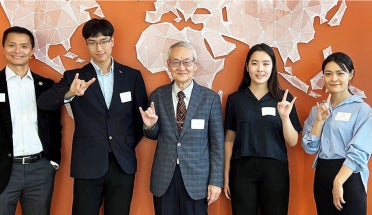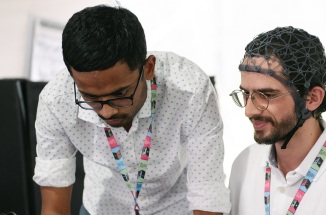
Researchers Explore Health Care Across Borders at FILUNI
- Oct 3, 2023
- Global Alumni Relations
- by Ellen Stader
Editor’s Note: This story is part of Texas Global’s series on The University of Texas at Austin’s leadership and activities at FILUNI 2023, a multinational book festival and conference that took place Aug. 29-Sept. 3 in Mexico City. The largest international Longhorn delegation in history — more than 140 people representing 23 units — traveled to the event, which attracted 42,000 attendees from 11 countries.
Innovative technology and incisive research claimed the stage at FILUNI 2023, during the seven health and well-being sessions presented by UT faculty.
A consistent buzz of excitement emanated from “Brain Interface for Hand Control,” technology demonstrations led by Professor José del R. Millán, who holds positions in the Cockrell School, Dell Medical School and Texas Robotics. The interface — a feat of neurotechnology that transforms brain activity into gestural actions — enabled participants to move their digits using only conscious thought.
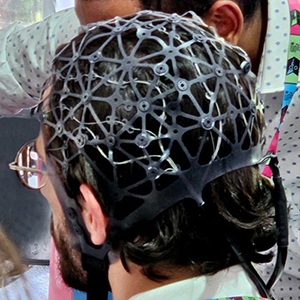
Aided by colleague Kumar Satyam, graduate student Hussein Alawieh donned a cap covered in electrodes that measured his brain’s electrical activity. The interface analyzed that activity, detecting Alawieh’s intent to make a hand gesture, sending small electrical currents to the nerves in his arm and contracting muscles to enact the desired movement of the hand. After witnessing the impulses registering on a computer screen, Millán invited spectators to test the interface by connecting directly to Alawieh via more electrodes. Wide-eyed reactions emerged from participants whose hands moved independently in accordance with Alawieh’s thoughts.
The implications for this technology could be game-changing, especially for patients suffering from strokes, cerebral accidents or spinal cord injuries that result in severe motor deficits. Millán emphasized that further progress and implementation will require multidisciplinary teams of engineers, neurologists, neurosurgeons, clinicians and therapists.
This message of alliance and teamwork surfaced across all health and well-being sessions, with affirmations of cross-border commonalities and collaboration echoing repeatedly throughout the conference.
“Health and sickness know no borders; they are sin fronteras,” said Harold Kohl, founder and director of the UT Physical Activity Epidemiology Program. “Many health problems are similar in Texas and Mexico, and they shouldn’t be treated in isolation.”
Kohl accompanied lead researcher Deborah Salvo with Miguel Pinedo and Pablo Montero-Zamora from the Department of Kinesiology and Health Education in a panel discussion exploring the influence of sociocultural environments and urban settings on the health of Latino populations in Mexico and Texas. They were joined by faculty from the Universidad Iberoamericana Ciudad de México and the National Institute of Public Health of Mexico.
Each presenter’s research addressed distinct environments and health issues: obesity, diabetes, sedentary lifestyle, and alcohol and drug abuse. Despite different areas of focus, the panelists reached a consensus: Social conditions in urban environments impose clear effects on human mental and physical health, and the most effective way to respond is with collective methods of training, mentoring and study, scaled up to yield a greater capacity of response.

A similar emphasis on systemic impact and collective solutions appeared in “Health Disparities Experienced by the LGBTQIA Community,” a presentation of research by Julie Zuniga, associate professor in the School of Nursing, and graduate researcher Oscar Franco-Rocha.
The session focused on social determinants of health for transgender communities, then went further to propose human-level clinical interventions to redress medical inequities commonly perpetrated upon trans populations — stigmatizing, misgendering or deadnaming patients — in a health care system originally built to heal.
“We focus on health care disparities for the LGBTQ community, which is a healing problem in Latin America,” said Franco-Rocha. “Bringing attention to those issues ... I think will broaden perspectives and change ways of thinking.”
Nursing School colleagues Alexandra Garcia, Heather Cuevas and Bruce Machona, along with Brandon Altillo from Dell Med, shared their research in diabetes management with peers from the College of Medicine at Benemérita Universidad Autónoma de Puebla (BUAP), a longtime partner with UT in global health initiatives. Presenters cited social determinants, including poverty, food insecurity and unstable housing, as direct links to the development of diabetes, which is rising in both the U.S. and Mexico.
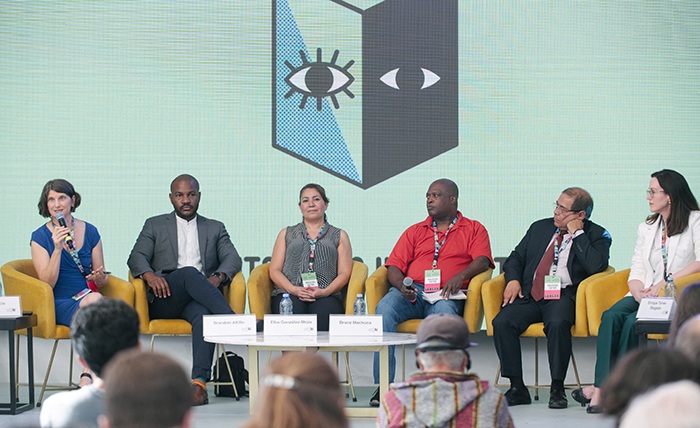
Dell Med and BUAP partnered in another session examining the Academic Model Providing Access to Healthcare (AMPATH), or Modelo Académico para Proveer Acceso a la Salud (MAPAS). Established in Puebla, the well-regarded program is designed to address health issues that affect rural populations in chronic poverty and geographic isolation. Teams of UT and BUAP professors apply community-focused approaches and cross-border perspectives on mental health, nutrition and health education issues.
AMPATH Mexico Director Ricardo Ainslie and professors Tim Mercer and Rebecca Cook shared their joint philosophy on working with communities in the fields of care, education and research.
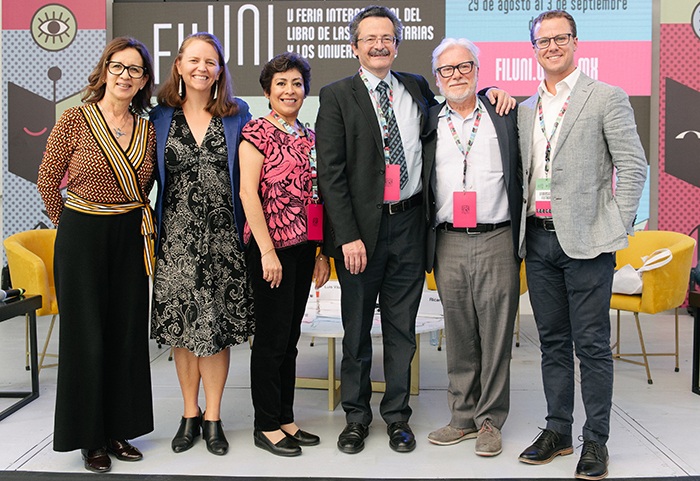
“For us at UT Austin, forming a collaborative partnership in Mexico is incredibly important, and we are thrilled with the opportunity to work and learn together with our BUAP [colleagues],” said Mercer. “Specifically, our goal is to partner together and engage with local communities in the Ministry of Health to transform primary health care in rural low-income communities, starting in Puebla, Mexico, that will be better able to address chronic diseases such as diabetes, heart disease and cancer.”


